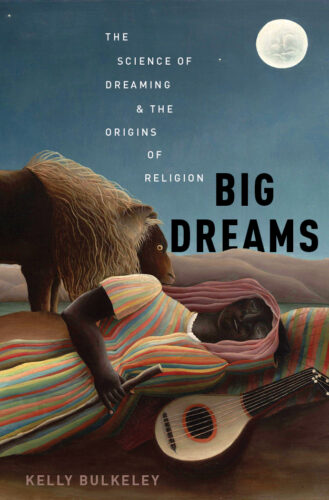 In the past couple of weeks I have spoken several times with journalists about Big Dreams: The Science of Dreaming and the Origins of Religion. It’s a daunting experience to have smart people read what you’ve written and ask sharp questions about how you put together your argument… and all the more intimidating with a tape recorder running. But I think the basic ideas from the book come through pretty well in these pieces. Continue reading “Recent Interviews About “Big Dreams””
In the past couple of weeks I have spoken several times with journalists about Big Dreams: The Science of Dreaming and the Origins of Religion. It’s a daunting experience to have smart people read what you’ve written and ask sharp questions about how you put together your argument… and all the more intimidating with a tape recorder running. But I think the basic ideas from the book come through pretty well in these pieces. Continue reading “Recent Interviews About “Big Dreams””
Proud to Be a Primate
 “Our goodness is as deep as our darkness”—that was Kimberley Patton’s gloss on the findings of Franz de Waal, a primatologist who spoke on Saturday at the American Academy of Religion conference in Atlanta. De Waal’s new book, Age of Empathy (2010), shows that cooperation, reciprocity, and conflict-resolution are just as natural in primates as are aggression and competition. Contrary to the Social Darwinist assumption that nature is bloody “red in tooth and claw,” de Waal’s research proves that non-human animals have all the basic building blocks of morality. This means that human morality is not just a matter of controlling our violent, selfish instincts, but rather enhancing and refining our other instincts for empathy, compassion, and sociability.
“Our goodness is as deep as our darkness”—that was Kimberley Patton’s gloss on the findings of Franz de Waal, a primatologist who spoke on Saturday at the American Academy of Religion conference in Atlanta. De Waal’s new book, Age of Empathy (2010), shows that cooperation, reciprocity, and conflict-resolution are just as natural in primates as are aggression and competition. Contrary to the Social Darwinist assumption that nature is bloody “red in tooth and claw,” de Waal’s research proves that non-human animals have all the basic building blocks of morality. This means that human morality is not just a matter of controlling our violent, selfish instincts, but rather enhancing and refining our other instincts for empathy, compassion, and sociability.
Also commenting on de Waal’s research was Armin Geertz, who highlighted the core idea of evolutionary biology that “all life is continuous.” What seems unique about humans is actually an extension of abilities and behaviors we find in other animals. Looking ahead to the future of primate research, de Waal said, “the trend is toward the continuity of humans and animals.”
Is this true of religion? When elephants mourn their dead, chimpanzees dance in rainstorms, and wolves howl at the moon, are we seeing the building blocks of spirituality? Can animals have mystical experiences? De Waal said it was difficult as a biologist to address such questions, but he did not rule out the possibility of affirmative answers.
Score a point for scientific open-mindedness.
What about dreaming? Both Patton and Geertz, professors of religious studies, mentioned dreaming as a universal human experience that factors into all religious traditions. De Waal did not talk about dreams directly, but the cognitive abilities he has identified in non-human primates (empathy, imagination, pretend play, etc.), combined with the similarities in brain functioning across all primate species, strongly suggest that humans are not the only dreamers in nature.
In his earlier book Chimpanzee Politics (1998) de Waal talked about the dreams of people who study primates:
“That chimpanzees are experienced in the first place as personalities is evident from the dreams of those of us who work with them. We dream about these apes as individuals, in the same way that other people dream about their fellow human beings as individuals. If a student were to say that he or she had dreamed of an ape I would be no less surprised than if someone claimed to have dreamed of a human.
“I clearly remember the first dream I had about the chimpanzees. In it my preoccupation with the distance between them and me was apparent. During this dream the large door to their quarters was opened for me from the inside. The apes were pushing each other aside in order to get a good look at me. Yeroen, the oldest male, stepped forward and shook my hand. Rather impatiently he listened to my request to come in. He refused point blank. That was out of the question, he said, and besides, their society would not suit me: it was much too harsh for a human being.” (41)
